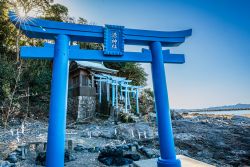
Originally published on metropolis.co.jp on January 2012

My wife and I used to live in a rental house. The neighbor on one side had an ancient, crippled-up dog. Each morning, he walked that mutt by our door just in time for the dog to relieve itself. On the other side was a lady who kept Rikki, a frisky young Akita, penned up and yelping in her yard. She also took in stray cats. That might have been admirable—except she never had them sterilized. We soon had generations of cats howling and scrapping over territory. Meanwhile, Rikki would snooze in the sun all day, saving his strength. Then he’d be up all night chasing the cats from the yard. Screeching felines ran into our garden and scrambled up onto our roof. One night, a tomcat flipped open the window screen and dropped onto our bed. The most shocking part? It took us ten years to move.
Originally, we’d paid two months rent as a damage deposit, or shikikin. I still can’t imagine what the sum was for, as the place didn’t even come with light fixtures. The landlady must have been afraid we’d steal the boards. Of course, there was also the two-month reikin (key money). On top of that, we’d pay another month’s rent every two years to renew the lease. We never moved because we never thought we’d get anything better.
Then we learned about another option, known here as a “DIY house,” better known in the US as a “fixer-upper.” You buy an old house and do it up yourself. This is not something you’ll hear about from Japanese realtors—the commissions are too small for them to bother. Instead, they’ll tell you the roof leaks. Or the house has ants.
But buying a DIY house makes a lot of sense if you’re planning to stay in Japan a while. First, there’s not much demand, so they’re cheap. That’s because most Japanese purchasers won’t look at old goods. And not just the Japanese. A foreign friend of mine just bought a new house. “Happy wife, happy life,” he chimed, grinning at me. Then he figured out it would take him more than 30 years to pay it off.
As for people whose in-laws offer them cash for a new house? My advice is to buy a DIY house—and bank the rest.
The main point in favor of the DIY home is that buying a new house in Japan is no investment. Until the 2008 crunch, Japan must have been the only G-20 country where prices kept dropping. Buying a new home here is like driving a new car off the lot. Try selling that car for the same price even a few hours later. After 20 or 30 years, a Japanese home is considered a knock-down. The owner sells the land and then pays to demolish his own house.
DIY houses, on the other hand, have already depreciated. And qualifying for a mortgage is no different—or maybe even easier—than for a new house. Even teachers like us on three-year visas can qualify for a UFJ loan.
That’s not to say all DIY homes are wonderful. We saw some that needed a bomb or a bulldozer, not a builder’s renovation. After looking for a few weeks and seeing about a dozen places, we found a nine-year-old house: it was half the price of a new one.
We renovated. And made some mistakes, too. For one thing, never hire another English teacher to help renovate. Even if their hobby is carpentry, they have a much higher hourly rate than most Japanese carpenters. Few Japanese carpenters can teach English, but they’re better at carpentry than most teachers.
While renovating was sometimes exhausting, it was fun, too. Home improvement has changed in Japan with the introduction of US-style big-box home stores like Cainz Home, Tostem, and my personal favorite, Unidy. And some men love tools the way some women love shoes. So, cruising down shopping lanes of stacked lumber, insulation, and plumbing fixtures, I now had the perfect excuse to buy myself a power saw and a four-speed electric drill. I just told my wife I needed it for home repairs.
Ultimately, the best thing about your own place is the freedom. Besides the added comfort and security, you can decorate. We painted the oatmeal-colored walls in our house yellow, ochre and pink. And doing-it-yourself means you can go a little crazy—because you want to, not because your neighbor’s dogs and cats are driving you there.
Have something to say about this story? Share your comments below.







